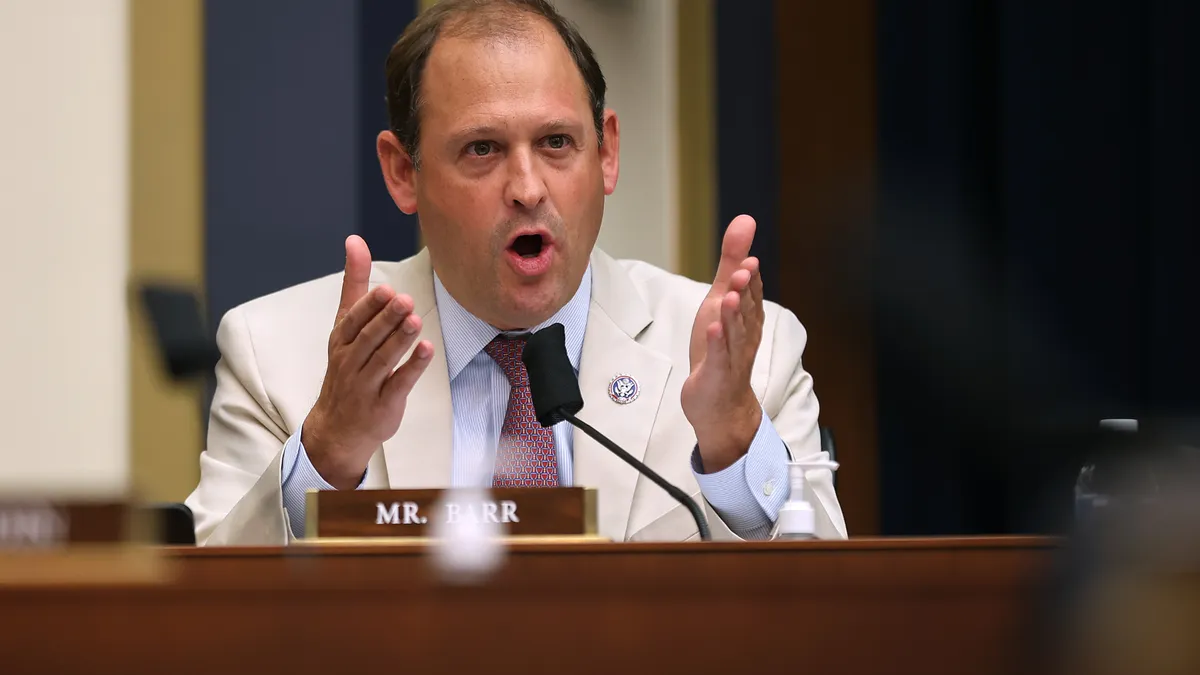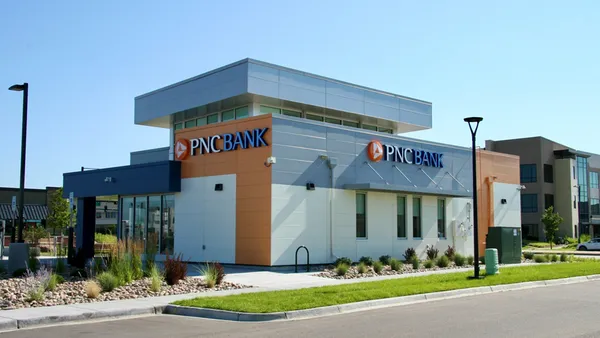Dive Brief:
- Republican lawmakers on Wednesday blasted the “onslaught” of bank regulatory reform efforts, chief among them the proposal that would require banks to hold more capital, during a House subcommittee hearing, as the industry awaits further Basel-related action from regulators.
- “Unfortunately, the future of the endgame proposal is unclear,” said Andy Barr, R-KY, chairman of the financial institutions and monetary policy subcommittee. “Administrative procedures followed by the agencies continue to be clumsy at best and politicized at worst.”
- Additionally, it isn’t clear whether regulators will delay other proposals — such as that concerning long-term debt requirements — until there’s a resolution on the capital requirements rule, said witness Jonathan Gould, a partner at law firm Jones Day. “I would suggest you ask the regulators,” he told lawmakers.
Dive Insight:
Barr took aim Wednesday at regulators’ frenzied efforts to push out a slew of “significant” proposals in recent months, including those related to long-term debt requirements, brokered deposits, bank mergers and executive compensation. But the hearing largely centered on regulators’ long-running effort to align capital requirements for U.S. banks with the Basel endgame and the potential impact of that proposal.
A capital requirements proposal regulators put forth in July 2023 faced swift and harsh criticism from the industry. From there, Federal Reserve Chair Jerome Powell indicated the proposal would face broad and material changes, and the central bank’s vice chair for supervision, Michael Barr, previewed adjustments to the proposal. Among them: the largest U.S. banks would be forced to hold 9% more capital, rather than 19% more.
Still, it’s unclear whether a reworked proposal will garner full support from the Office of the Comptroller of the Currency and the Federal Deposit Insurance Corp., or what its timeline could look like from here. FDIC board Republicans Travis Hill and Jonathan McKernan have suggested they’re not in favor of Basel revamps, as has Democrat Rohit Chopra.
All of that has resulted in “lingering uncertainty about the future rules of the road” for banks, Andy Barr said. Although some of Michael Barr’s previewed changes are encouraging, the vice chair’s speech “suggests that considerable work still remains, particularly to the market risk component of the endgame proposal.”
Michael Barr’s remarks “sketched out limited hints” of what may be coming and provided numbers “without underlying details,” Andy Barr said. The Fed’s vice chair for supervision also said new proposals would be voted on “soon” at the central bank, but Andy Barr said there’s no indication that’s occurring.
Rep. Bill Foster, D-IL, called Wednesday’s hearing “premature,” in the absence of a reproposal, and said it will only serve to fuel speculation on the topic.
As for Michael Barr’s indication the capital requirements increase will be smaller, “it’s of great interest to me as to what areas of [banks’] operations are responsible for those increases and what are not,” the subcommittee’s ranking member said.
Until regulators offer more clarity, Gould said those in the industry are left “gaming out various scenarios and timelines.” It’s also unclear whether the agencies will repropose a portion of the rule or all of it, which is “highly irregular,” noted Gould, who previously worked at the OCC.
“Hardly an ‘endgame,’ a more realistic moniker might be the ‘Basel III: Infinity War,’” Gould said, in a nod to the popular Marvel films, one of which also features the “endgame” name.
The Securities Industry and Financial Markets Association has expressed concern about the proposal, in part because it targets banking organizations’ capital markets activities for some of the largest increases, CEO Kenneth E. Bentsen Jr. said during the hearing.
It appears regulators have addressed some of the organization’s concerns, he said, adding that he’s eager to see the reproposal and quantitative impact study conducted.
“Frankly, we will need time, I would argue, to go and do an additional QIS” on what’s in the reproposal, Bentsen said.
Still, he wondered why regulators are pursuing a 9% increase when other jurisdictions are moving toward a capital-neutral stance. The Bank of England this month said its capital reform effort would mean a 1% increase in tier 1 capital.














